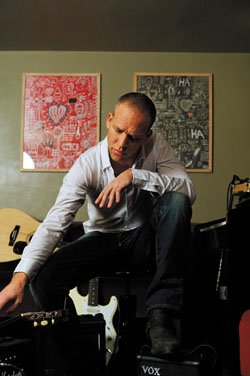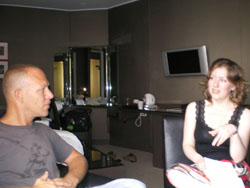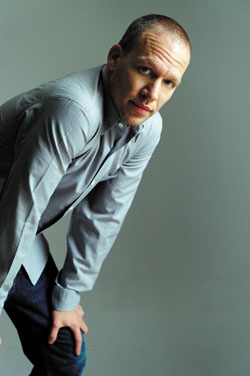
PORTRAIT
Avishai Cohen, portrait of a musician without boundaries (1/2)
Israeli musician Avishai Cohen was in Paris in June to promote his new album, “Aurora”, and met students from the « Europe and culture  » project – a great occasion for him to share deep thoughts about his life path, his conception of arts and his latest music projects. Enjoy this emotionally charged moment…here is Episode 1. Episode 2 : “Aurora” release
Could you tell us how it all began ?
It began when I was a child ; I just found joy and freedom in music. As a kid, my imagination and my stimulation were fertilized by music. I guess that only music gave me the opportunity to express some feelings and this need to communicate certain things has become more important throughout time. I realized that music really became a language that I would use eventually in my life.
Have you been strongly influenced by your country and New York ?
It’s hard to say where it is mostly from. As far as music is concerned, I believe that it doesn’t matter where you are from. If you open yourself up to music, you will always feel good music. Music that sounds sincere and comes from a real place and that brings you a great life sensation. So it happened to be Israel. Then I went to New York and it was the jazz and the city’s influences. But any place can have the same effects by helping you to find the truth and also things that have substance.
Could you tell us more about the period when you moved to New York ?
I was 21, it was in 1991 when I moved there to pursue a career as a jazz bassist. I was always open to other things, so I got into Latin music, funk and reggae, and I soaked up a lot of things that were going on in New York, especially jazz : I went into the jazz scene and I started getting my confidence little by little as a bass player, in places where a lot of great musicians played, met a lot of people, and grew from that.
I just found joy and freedom in music
Did the Latin musicians you met especially have a real influence on your musicianship ?
Yes, I was really attracted by salsa and also by Afro-Caribbean grooves and music. I was checking out a lot of that and I was learning with a teacher a little bit. I played with those guys and I developed a very strong connection to that music that shaped a lot of my bass playing as well as my musicianship as a writer too. It’s a very important element in my life.
And you recently got back to Israel, where you are now living.
Yes, I have been living there for the last few years now, after 12 years in New York. I have been operating from there and going out to play all over the world. I enjoy being in Israel for many reasons and most of all because I am from there and I feel connected to the place and my family. For me, it is right to be there right now.
How is the music scene out there at the moment ?
There’s lots of talent. Since I went to New York in the middle of the nineties, a few other people paved the way for a lot of young musicians that go to New York today. There is already like a “thing” about Israeli musicians, so I feel very happy with the fact that something happened since I have been there, and made a name for myself, and the fact that other Israeli musicians are more easily accepted today. Also, because of me and a lot of other people, the jazz scene in Israel has become much bigger and there is much more awareness. There are a lot of young movements that want to go to New York…a little too much sometimes in the sense that New York is seen as a place where anything is possible – and this has never has been the case. New York is actually not like a secret place where you go and then become a jazz musician. But indeed, there is much more awareness and there are various tools (thanks to Youtube, MySpace, etc.) that are easily accessible today that you don’t have to go too far to be in touch with the scene and to observe what is going on. For young people, it’s a big advantage to keep in touch with the scene wherever they are. It widens the scene and it makes it a bit more virtual. Nonetheless it’s a great, quick insight into the scene, into people’s minds and talent.
Israel is and has always been culturally mixed with Moroccan, Turkish, Greek, Bulgarian, Eastern European cultures
…as long as it still attracts people to concerts, of course.
Sure, there are great things about going to concerts, don’t get me wrong. I am just saying that to every development there is a regression of a certain kind. There is so much virtuality, there is so much “screen” that there is less of actual, you know, going somewhere, being part of a struggle and learning it through going to jazz clubs, rather than seeing it on screen, it is a different effect. But, all in all, it is a great thing that there is access to everybody.
To what extent is the Israeli music scene inspired by other cultures – Tel Aviv for instance, which is reckoned to be a very international city in terms of cultural influences ?
Again, the influence is becoming more and more important within the media or by the quick access to different things. But Israel is and has always been culturally mixed with Moroccan, Turkish, Greek, Bulgarian, Eastern European cultures and also the influences of Jewish descending people coming from different places 30, 60 or even 70 years ago. The influences are seen on music, on language and on food. In that sense, it is a great thing, it is in the air, it doesn’t even have to appear on stage or on the radio. Different people absorb it in different ways. I feel very blessed in the way that I can consider myself an open person who absorbs anything that has a spiritual or just a real meaning. It could be anything, from anywhere, as long as there is real substance to it.
One undeniable quality of your music is that it brings people with different horizons. Is this special to France ?
No, it is not. I have to say it is a magical and very valuable thing that I have noticed, for a few years, about the people that come to see my music. It unites people of different ages and that is a big compliment to me. It would be great to see just a thousand young people, but it wouldn’t be as strong as seeing within the 1,000 400 young people, 200 older people, and 300 infants. I am pleased to see kids and very old people, since I know that between both generations there are always all ages. Also, I enjoy seeing people that don’t usually connect to jazz, such as parents bringing their children or grand parents.
By Julie Diebolt, with the help of Cécile Parriat
Read the intreview in french : Episode 1 Episode 2
This interview was done on the occasion of the last event held by the “Europe and culture” project in Sciences Po Paris, « Crossed views on European culture – how do Europe and its neighbours influence each other ? », dedicated to the mutual cultural and artistic influences between Europe and its neighbours.
More about…
 Avishai Cohen
Avishai Cohen
Don’t miss his next concerts in Paris :
November 24th and 25th 2009 – Alhambra, Paris 10e
All European and French tour dates to be found on
his myspace
 « Europe and culture » group project
« Europe and culture » group project
Check out our Facebook page and join the mailing list by writing to leuropeetlaculture(at)gmail.com
Bloc-Notes
-
«  Chasse fermée  » remporte le prix du public au palmarès d’Univerciné 2013
-
Hellfest 2013 : Fragil prend refuge dans le nid des enfers
-
La 7ème Vague ouvre le bal des festivals
-
Le sculpteur Yonnais Pierre Augustin Marboeuf expose à Nantes pour la première fois
-
Edito du 12 avril 2013 : du fond des abysses


 Le dernier numéro
Le dernier numéro



 Haut de la page
Haut de la page




